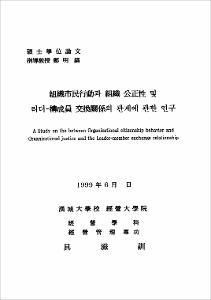組織市民行動과 組織 公正性 및 리더-構成員 交換關係의 관계에 관한 연구
- Files in This Item:
-
-
Download
 000000066476.pdf
기타 데이터 / 2.54 MB / Adobe PDF
000000066476.pdf
기타 데이터 / 2.54 MB / Adobe PDF
-
Items in Repository are protected by copyright, with all rights reserved, unless otherwise indicated.
 000000066476.pdf
기타 데이터 / 2.54 MB / Adobe PDF
000000066476.pdf
기타 데이터 / 2.54 MB / Adobe PDFItems in Repository are protected by copyright, with all rights reserved, unless otherwise indicated.